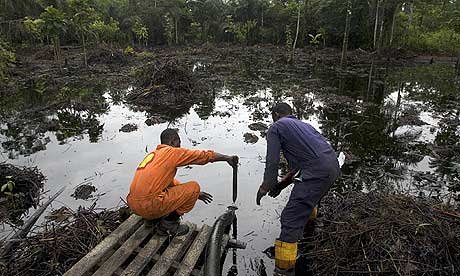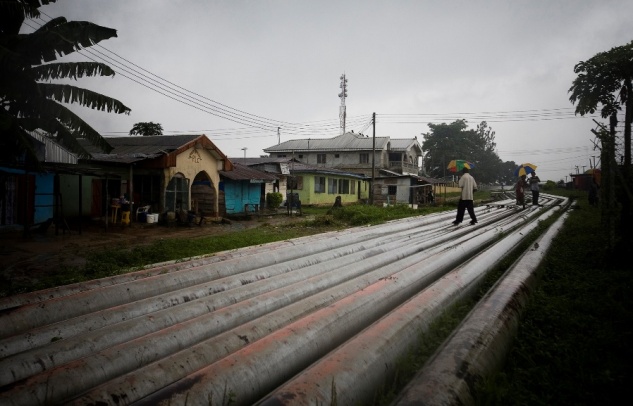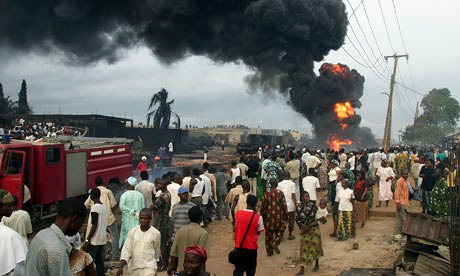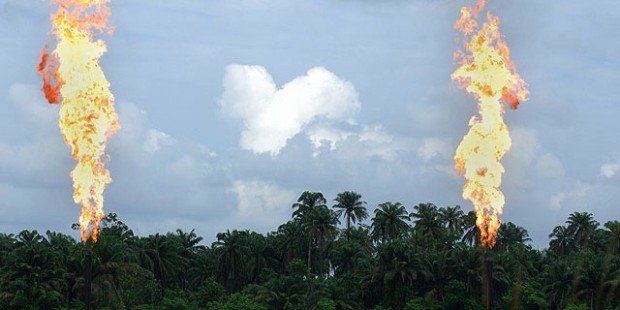By Isabella Nilsen
Shell is one of the companies that the Strathclyde Pension Fund (SPF) is investing in. Shell’s oil drilling and extensive exploration for resources in the Niger Delta has made an extensive damage to the communities in the area, as well as the environment. This has been going on for a long time, and it needs to stop. However, for that to happen, people need to stop profiting from the damage, which is why the SPF need to divest.
The Niger Delta is situated in the south of Nigeria, and is one of the world’s largest wetlands[1] and the home for nearly 30 million people[2].It is truly ironic that Shell claims to be ’working with the communities’[3], when they have been using substandard techniques for drilling oil that has had a lasting effect on the people living in the area: higher rates of cancer and asthma due to gas flaring[4]; oil spills leading to a lack of clean water and a lack of food safe enough to eat, all in all resulting in that many have had to abandon their homes[5].
Oil spills

Oil spill in Niger Delta © Ed Kashi/Corbis
Shell began drilling for oil in the Niger Delta in the 1950s. It is difficult to measure exactly how much oil has been spilled in the area, since many of the spills go unreported. Nevertheless, it has been assessed that more oil is spilled every year in the Niger Delta than the amount spilled in total in BP’s Deep Water Horizon oil spill in the Gulf of Mexico in 2010[6]. Although this number does not only include Shell’s operations, but also other companies’ in the area, Shell is the main contributor, and in 2009 alone they spilled at least 14,000 tonnes of oil.[7]
One reason for the numerous and extensive oil spills is the pipelines that they are using, many of which are old, and therefore sensible to corrosion[8]. The majority are also laid over the ground, meaning that they are not protected from corrosion and natural elements, nor from possible attacks, which have occurred in the past[9]. In other areas where Shell operates, they tend to lay oilpipes underground, for these reasons. What makes matters even worse is that the local population is rarely consulted in the laying of the pipes, resulting in many of the pipes being put close to homes and local schools, leading to communities suffering even more when leaks occur.[10]

Oil pipes in the Niger Delta, ©Veronique de Viguerie[11]
The leaks have led to involuntary migration, since there is a lack of food and clean water. Emadee Roberts Kpai, who was a farmer and fisherman until an oil spill made it impossible to continue, stated:
‘Our creeks are no more. Fishing activity is no more productive. The farm I should be farming has already been devastated by oil spills from Shell. Our crops are no longer productive. No fish in the water. We plant the crops, they grow but the harvest is poor’[12]

Ruptured pipeline in a suburb to Lagos, © George Esiri, Reuters[13].
Gas flaring
‘While Shell and its shareholders count their profits [,] all we can count are the early graves that their toxic gas flares keep sending our people. It is morally wrong for Shell to continue with gas flaring despite a [court] ruling that has ordered them to cease it. Shell continues not only to waste Nigeria’s natural resources in this way, but is criminally wasting the lives of people in our communities who cannot avoid the impacts of gas flaring’[14]
– Nnimmo Bassey, human rights and environmental activist, working for Friends of the Earth Nigeria.
Since Shell can earn more money from transporting oil than natural gas, they are choosing to burn the vast majority (75 % of the natural gas extracted in the Niger Delta)[15]. Some of the gas flares have been burning constantly since the 1960s, and are even visible from space[16]. Gas flaring is linked with leukaemia and asthma in human beings. It also leads to acid rain which acidifies the water in lakes and streams, killing animals and plants[17].
There are penalties for flaring gas in Nigeria; however they still remain low, and are not always paid. Every year a total of $1.1 billion in penalties for gas flaring remain unpaid[18].

The gas flares have been compared to ‘giant cigarettes in the sky’ by Nnimmo Bassey, photo © Friends of the Earth Europe [19]
Protest
Not surprisingly, the local population have organized protests and are working against the crimes committed against them. However, protests and other types of activism are often met with repression by the military, sometimes even ending with people being killed. In some occasions, the military and local government have been assisted by oil companies[20].
One of the activists killed, was Ken Saro-Wiwa who was hanged by the government in 1995. At the time, he was the president of the Movement for the Survival of Ogoni People (MOSOP), a group fighting for the human rights of the Ogoni People, who live in the Niger Delta and are among those who have suffered the most from companies like Shell’s actions. In 1993, Saro-Wiwa led a non-violent march against Shell, demanding that they clean up after their oil spills and repay the communities. In 1994, he was arrested by the government, and despite international leaders, and NGOs such as Amnesty demanding that he should be released; he was executed in 1995 alongside eight co-defendants. During all of the process, Shell stayed quiet[21].
What can we do?
Firstly, we need to stop investing our money into these companies that are wrecking the planet and people’s lives. Therefore, we are calling for Strathclyde Pension Fund to divest from fossil fuel companies, including Shell. Secondly, we can put pressure on Shell to clean up and repay the communities, and stop their exploiting and dirty methods of extracting oil and natural gas in the area, which among others, Amnesty and Friends of the Earth have done in the past[22][23].
